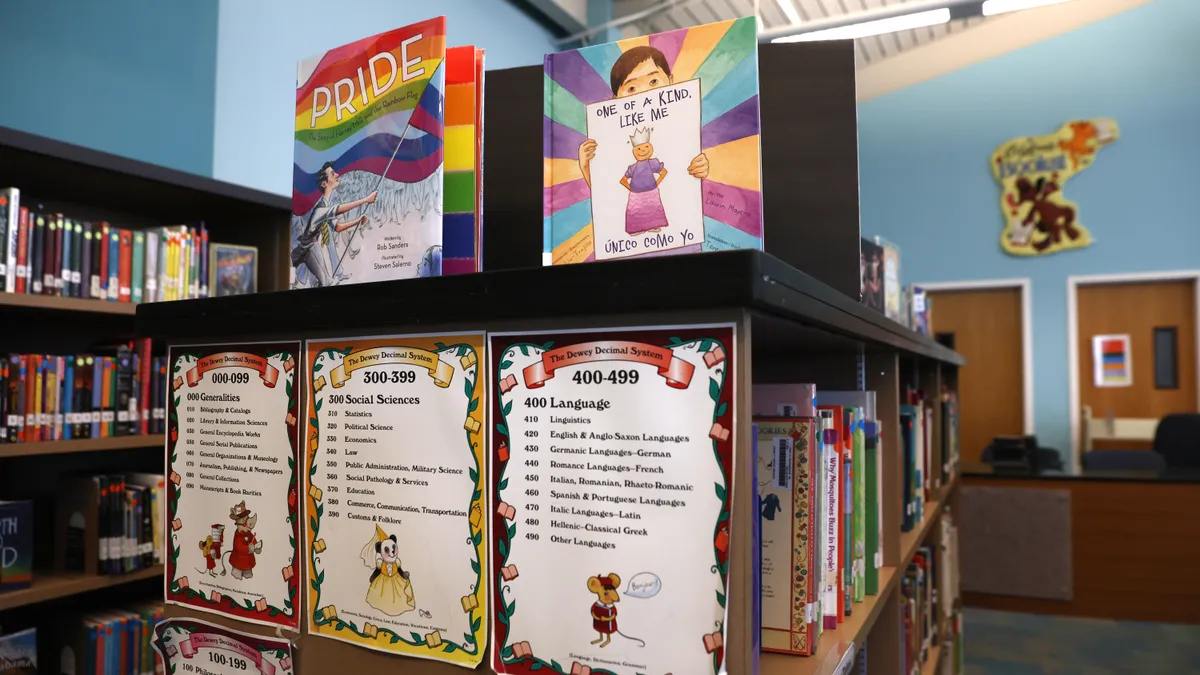Dive Brief:
- For the first time in three years, legislators are shifting away from proposing bills that restrict classroom discussions on race and racism, according to a Tuesday report by PEN America tracking “educational gag orders.” Instead, state bills are increasingly moving toward censoring schools from covering sexual orientation and gender identity, the report found.
- Initially when curriculum censorship bills first entered the state legislative arena in 2021, the report said 10 proposals targeted The 1619 Project, a long-form journalism project published by the New York Times in 2019 that digs into the impact of slavery and the contributions of Black Americans to the formation and development of the United States. In 2021, just one bill was introduced to ban instruction on sexual orientation or gender identity.
- However, by 2022, state legislators proposed an equal number of bills targeting both The 1619 Project and LGBTQ+ issues — 15 on each topic. This year, 39 bills were proposed to restrict LGBTQ+ topics while one bill was introduced to ban The 1619 Project, said PEN America, a free expression advocacy nonprofit.
Dive Insight:
Though there’s been an increased focus on censoring LGBTQ+ issues in K-12 over the last three years, the total number of educational gag orders introduced for both higher education and K-12 declined in 2023 compared to 2022.
Overall, there were 54 bills introduced in 2021, 143 in 2022 and 110 in 2023, according to PEN America. Of those proposed bills, 12 were adopted by state legislatures in 2021, 8 in 2022 and 10 in 2023.
PEN America added that one potential reason there’s been a legislative pivot away from curriculum censorship on topics of race and racism is because “the low-hanging fruit has already been picked,” as most Republican-majority states have already enacted classroom restrictions on the matter.
Additionally, the report cited several public polls that found little support for race-focused censorship. Though there are still partisan differences, a majority of Republicans (73%) support high schools teaching the causes and effects of racial inequality — compared to 97% of Democrats, a 2022 survey by the University of Southern California.
“It appears that America’s would-be censors now see proposals to restrict conversations about sexual orientation and gender identity as more of a winning political issue than efforts to restrict discussions of race and racism,” the PEN America report said.
PEN America’s findings reflect the widening attention directed toward censoring LGBTQ+ perspectives and topics in K-12 schools in recent years. In another example illustrating the latest push to censor schools, book bans jumped 33% between July 1, 2022, and June 31, 2023, according to a September report by PEN America.
While state legislators may not be trying to censor issues of race and racism via bill proposals as of late, these topics are still being targeted through other means at more local levels.
For instance, PEN America found the majority of the banned book topics covered the experiences of marginalized people with 30% of these restrictions including characters of color and themes of race and racism. While another 30% of the banned books represented LGBTQ+ identities.
Restricting speech on sexual orientation and gender identity in classrooms has also grown increasingly partisan, particularly among state leaders. Democrat pushback is slowly building against efforts to censor books and curriculum.
In September, California Gov. Gavin Newsom, a Democrat, enacted LGBTQ+ inclusive measures, which prohibit school districts from banning books or materials with inclusive and diverse viewpoints. Another Democratic governor, J.B. Pritzker of Illinois, also signed the first statewide halt on book bans in June.
At the federal level, the U.S. Department of Education appointed Matt Nosanchuk, a former Obama administration official, as a new coordinator to take on book bans in schools and libraries across the country.
“Book banning erodes our democracy, removes vital resources for student learning, and can contribute to the stigma and isolation that LGBTQI+ people and other communities face,” the White House said in a June fact sheet announcing the new role.
Conservative advocates often cite parental rights and child protections from sexually explicit content to justify book bans and efforts to restrict LGBTQ+ topics in school. Others have said the term “book ban” can be misconstrued, since the public can still access these texts to purchase online or from bookstores. Meanwhile, Democrats have said the matter is a threat to democracy and free speech.













